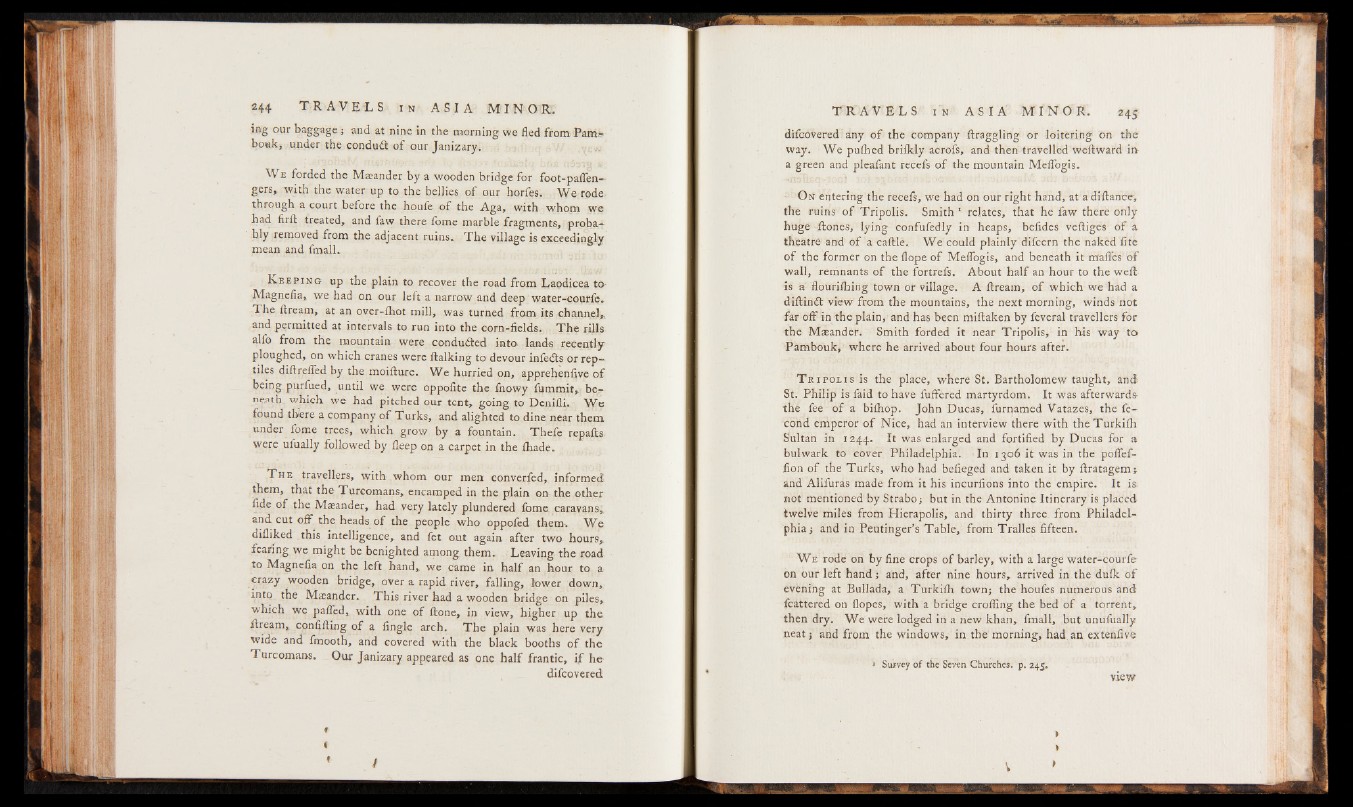
ing our baggage ; and at nine in the morning we fled from Pam.-
boek, under the condudt of our Janizary.
W e forded the Mseander by a wooden bridge for foot-palfen-
gers, with the water up to the bellies of our horfes. We rode
through a court before the houfe of the Aga, with whom we
had full treated, and faw there fome marble fragments, probably
removed from the adjacent ruins. The village is exceedingly
mean and fmall.
K e e p in g up the plain to recover the road from Lapdicea to-
Magnefia, we had on our left a narrow and deep water-courfe.
The Itream, at an over-lhot mill, was turned from its channel,
and permitted at intervals to run into the corn-fields. The rills
alfo from the mountain were conducted into lands recently
ploughed, on which cranes were ltalking to devour infedts or reptiles
diftrefied by the moifture. We hurried on, apprehenfive of
being purfued, until we were oppofite the fnowy fummit, beneath
which we had pitched our tent, going to Deniili. We
found there a company of Turks, and alighted to dine near them
under fome trees, which grow by a fountain. Thefe repafts
were ufually followed by fleep on a carpet in the (hade.
T he travellers, with whom our men converfed, informed
them, that the Turcomans, encamped in the plain on the other
fide of the Maeander, had very lately plundered fome caravans,
and cut off the heads of the people who oppofed them-. We
difliked this intelligence, and fet out again after two hours,,
fearing we might be benighted among them. Leaving the road
to Magnefia on the left band, we came in half an hour to a
crazy wooden bridge, over a rapid river, falling, lower down,
into the Maeander. This river had a wooden bridge on piles,
which we palled, with one of Hone, in view, higher up the
Itream, confining of a Angle arch. The plain was here very
wide and frnooth, and covered with the black booths of the
Turcomans. Our Janizary appeared as one half frantic, i f he
difeovered
t
t /
difeovered any of the company (draggling or loitering on the
way. We pulhed brilkly acrofs, and then travelled weftward in
a green and pleafant recefs of the mountain Melfogis.
On entering the recefs, we had on our right hand, at a diftance,
the ruins of Tripolis. Smith' relates, that he faw there only
huge Hones, lying confufedly in heaps, befides veftiges of a
theatre and of a caftle. We could plainly difeern the naked fite
of the former on the (lope of Melfogis, and beneath it malfes of
wall, remnants of the fortrefs. About half an hour to the well
is a flourilhing town or village. A dream, of which we had a
diftindt view from the mountains, the next morning, winds not
far off in the plain, and has been miftaken by feveral travellers for
the Mseander. Smith forded it near Tripolis, in his way to
Pambouk, where he arrived about four hours after.
T r i p o l i s is the place, where St. Bartholomew taught, and
St. Philip is faid to have fuffered martyrdom. It was afterwards-
the fee of a bilhop. John Ducas, furnamed Vatazes, the fe-
cond emperor of Nice, had an interview there with the Turkilh
Sultan in 1244. It was enlarged and fortified by Ducas for a
bulwark to cover Philadelphia. In 1306 it was in the polfef-
fion of the Turks, who had befieged and taken it by ftratagem
and Alifuras made from it his incurfions into the empire. It is
not mentioned by Strabo; but in the Antonine Itinerary is placed
twelve miles from Hierapolis, and thirty three from Philadelphia;
and in Peutinger’s Table, from Tralles fifteen.
W e rode on by fine crops of barley, with a large water-courle
on our left hand; and, after nine hours, arrived in the dulk of
evening at Bullada, a Turkilh town; the houfes numerous and
fcattered on Hopes, with a bridge eroding the bed of a torrent,
then dry. We were lodged in a new khan, fmall, but unufually
neat; and from the windows,- in the morning, had, an extenfive
* Survey of the Seven Churches, p. 245,